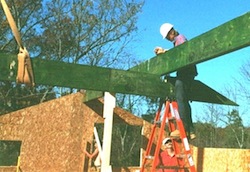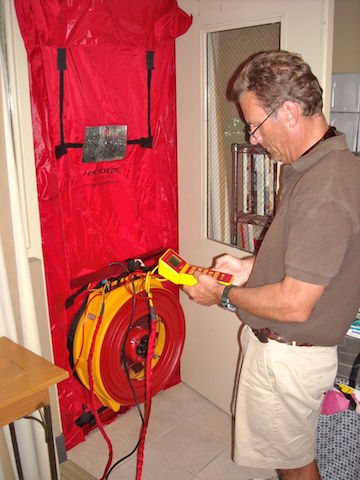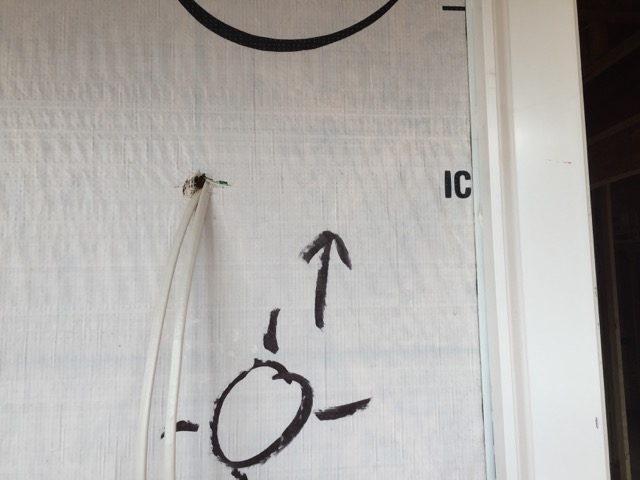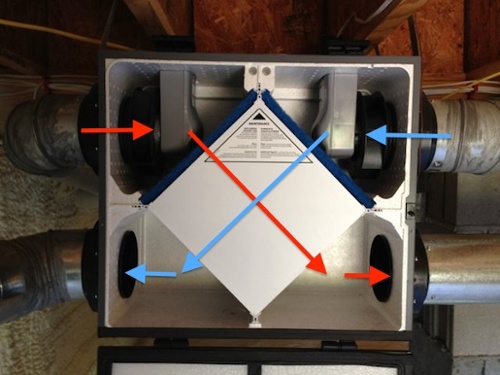10 Questions to Ask Your Prospective Home Builder

You’re having your dream house built. You’re into the design phase, working with an architect or looking through collections of house plans. You’re doing your homework, trying to find out how to ensure you get a top quality house. And that’s when you run into all this stuff about building science, high performance homes, HVAC design, blower door testing, and the like. Now you’re hooked.
The problem you run into next is figuring out how to get that knowledge applied to your dream home. If you’re building the house yourself (as I did back in 2001), it’s on your shoulders. But most people aren’t owner-builders, instead hiring a professional home builder to bring their dreams to reality. If that’s you, keep reading. Hiring a builder is arguably your most important decision, so here are some questions you can ask prospective builders to find out how likely they are to do things the right way.
1. What is your view of airtight homes?
The builder’s answer to this question can tell you a lot. If they tell you, “A house needs to breathe,” you probably don’t need to waste any more time with them. Save your time to find a builder who appreciates the importance of an airtight building enclosure. You may not find a builder who gives you the ideal answer, but you want one who recognizes that greater airtightness is a good thing. If you can find one who’s had blower door tests even when they weren’t required, that’s a plus. And of course you want them to agree to have your house tested.

You can ask the builder about their previous airtightness test results. Here in Georgia, all new homes have to come in below 7 air changes per hour at a pressure difference of 50 Pascals (ACH50).
2. What is your preferred water resistant barrier (WRB)?
Controlling liquid water outside the house is the most important thing you can do to prevent failure. Yet, because water control failures often show up after the warranty period, some builders don’t care that much about them. There’s some pretty basic rules about controlling water, and although it’s not universally true, I find that builders who use the cheapest WRBs often seem to do the worst job controlling the water.
Perforated plastic house wrap is at the bottom of the list in my opinion. House wrap can work well if it’s installed properly. It works better if it’s made of spun-bonded polyolefin, like Dupont’s Tyvek HomeWrap. Better yet is a non-house wrap WRB, like Huber’s Zip System sheathing, liquid-applied membranes (like Prosoco’s R Guard or Tremco’s Envirodry), or peel-and-stick membranes. [Disclosure: Huber is an advertiser in the Energy Vanguard Blog.]
3. How do you handle penetrations in the building enclosure after the WRB has been installed?
Controlling liquid water is critical. The WRB does that, but when it gets penetrated by wires, pipes, or dryer vents after it’s installed, it needs to be flashed properly. The best answer here would be if the builder tells you they plan ahead for every penetration and make sure each one has proper flashing ready to go before the hole is ever cut.

4. How do you ensure good installation quality of insulation?
If a prospective builder starts talking about insulation installation grades (I, II, or III), you’ve found one who knows something about this issue. Good answers here would include:
- We insist on Grade I installation quality for all insulation.
- We make sure all cavities are filled completely with as little compression as possible.
- We hire a third party inspector to make sure it’s done right.
5. How are the heating and air conditioning systems designed?
“We leave that up to the HVAC contractor” is not an acceptable answer. That doesn’t mean the HVAC contractor doesn’t do it, but the builder should know how they’re doing it. And the way it should be done is with room-by-room load calculations, proper equipment selection, and ducts designed for the right air flow to each room. Better would be for them to say they use a third party HVAC designer, but you’re more likely to hear that from your architect than from a builder.
6. Do you have a preference for duct location?
Not so good if they answer that they always put them in the attic, and the attic is vented. That’s a common practice outside of cold climates, but that doesn’t make it right. What you want to hear here is that they try to get the ducts into conditioned space. Sometimes that means moving the conditioned space boundary to include the attic or the crawl space.
7. What measures do you take for combustion safety?
Probe for any awareness of this issue. If they ask what you mean, ask what their stance is on natural draft water heaters and ventless fireplaces. You don’t want either of those things inside the conditioned space.
8. Do you normally install whole-house mechanical ventilation systems?
If you get this far into your list, that means you’re talking to a builder who believes in airtightness. That means they must believe in whole-house mechanical ventilation. The building code requires mechanical ventilation when the house tests at 5 air changes per hour or lower in the blower door test. If you’re getting a new house and want it built right, you definitely want it to be tighter than 5 ACH50, so you’ll need some type of mechanical ventilation. I recently wrote about some ways to do balanced ventilation, which is the best way to go.

9. Have you used third party inspections or had your homes certified in voluntary programs like ENERGY STAR?
If your prospective builder has experience with building to the standards of programs like ENERGY STAR, LEED, or Passive House, you’ll probably have an easier time getting them to get the details right. That’s because these and similar programs have requirements that help ensure a house is built better. It’s not a guarantee, of course, but at least they’ll have some familiarity with checklists and good installation practices.
10. Would you be willing to have a design review with the critical trades?
Some builders don’t want you involved with the process at all. They just want to take the plans, build the house, and have you show up when it’s all done. Everyone’s busy now that the housing market has heated up again, and extra meetings take time away from other stuff.
But, a good builder realizes the importance of getting everyone on the same page and that it can save time down the road. Getting the architect, the builder, the HVAC contractor, the plumber, the electrician, and the insulation contractor together to go over the plans and goals for the house can prevent a lot of problems that might crop up otherwise. If your builder is willing to have such a meeting, it can make everything go smoother.
Builders can be like wild animals
If you live in an area with a lot of green building happening, you may have an easy time finding a builder who believes in building science. Even in those places, however, there are a lot of builders who think high quality building simply means high quality finishes. What you’re looking for is that builder who is at least on the path to understanding that a high quality house is high quality to the core. But they may be a little shy about it.
Experienced home builders have developed ways of doing things that work for their businesses. Many are changing with the times, but they may still be a bit shy about jumping in with both feet. If you come at them with both barrels blasting them building science questions, you may scare them off. They’re like wild animals in that way. You have to approach them slowly because they spook easily.
Even a bad builder will know a lot more than you about the whole process of building a home. As long as they’re still in the running with you, show respect for that. Even when they’re out of the running, it’s best not to antagonize them. What you’re looking for is a builder you can work with, someone who is at least open to the idea of putting extra time and attention into the building enclosure and mechanical systems. The questions above should give you a good picture of which ones might be able to do a good job in building your dream home.
Related Articles
How to Get the Best Possible New Tract Home
10 Essential Steps to Building a Pretty Good House
Air Barriers, Vapor Barriers, and Drainage Planes Do Different Jobs
NOTE: Comments are moderated. Your comment will not appear below until approved.
This Post Has 12 Comments
Comments are closed.

This is just the kind of
This is just the kind of simple advice someone like me needs when looking at new construction. I want to print this for long term reference. Thankso very much!
You’re welcome, Mark. Glad
You’re welcome, Mark. Glad you found it helpful.
I’m afraid you may be living
I’m afraid you may be living on a fools paradise, at least around here. I have pretty much given up hope that any reasonable quantity of builders are even remotely acquainted with building science. On top of that the vast majority of homeowners are much more interested in great rooms and granite counters over a competently built house. It always comes down to cost and there is rarely if ever enough money in the budget to properly supervise trade contractors and inspect their work. Contractors tend to not know enough to even evaluate their trades work. I’ve seen way too much incompetent construction lately to have any faith in most builders to do the right thing for their clients. It’s a freaking mess of an industry and until owners start demanding quality it’s not going to happen. It’s a complex process and people don’t like process. They much prefer things which are easier to understand. Great points on your post but I have no hope that high performance construction will become widespread anytime soon.
Well, no one can say you don
Well, no one can say you don’t live up to your moniker, Carl. By the way, how’s that new house of yours coming along?
Boy, did the subject of this
Boy, did the subject of this article put a smile on my face. Can’t wait to share it with clients. And because most our clients are already aware of some of the basics of good building science, they sometimes are in the over-zealous category. I love the closing of the article:
“If you come at them with both barrels blasting them building science questions, you may scare them off. They’re like wild animals in that way. You have to approach them slowly because they spook easily.
Even a bad builder will know a lot more than you about the whole process of building a home. As long as they’re still in the running with you, show respect for that. Even when they’re out of the running, it’s best not to antagonize them. What you’re looking for is a builder you can work with, someone who is at least open to the idea of putting extra time and attention into the building enclosure and mechanical systems.”
Well said! Thanks Allison.
Debbie
You’re welcome, Debbie! Share
You’re welcome, Debbie! Share away.
Alternatively, most
Alternatively, most homeowners would be well served by hiring an architect (or home designer) who has mastered building science. In that case, the builder qualification list can be greatly condensed:
1) demonstrated experience following detailed construction drawings & specs, subject to 3rd party verification
2) demonstrated experience meeting a verified air tightness spec (in fact, I would argue the builder should contractually agree to a mutually acceptable envelope tightness spec, but good luck with that)
3) willingness to select mechanical sub based on independent mechanical specification
This last item is so atypical in residential that I would argue this spec is best best arranged for by the homeowner (see “Who Can Perform My Load Calculations” at greenbuildingadvisor.com).
The other items on the list should be covered by the plans & specifications package and thus should instead be questions to ask prospective architects.
BTW, #10 is a great idea but I think builders who satisfy #1 and #2 will almost certainly have incorporated a design review among key subs into their process.
I would honestly say the
I would honestly say the opposite. If I had to choose between dream architect or dream builder I would probably choose the latter. I think way too many custom home clients rely on the expertise of the architect to spec all of the right details, materials, mechanical systems, etc when almost none of those details will yield the intended results if not installed, tested, and commissioned to perform as designed.
I agree with you Ryan, BUT,
I agree with you Ryan, BUT, homeowners who want to build a home are limited to builders in their local area, whereas an architect or home designer can be anywhere. This greatly increases the odds of finding a someone who truly understands how to design and specify high performance homes. The same applies to hiring an independent mechanical designer. I also agree that 3rd party verification is critical, as well as finding a builder who can (and will) follow detailed drawings.
People who are fortunate enough to live in markets serviced by highly skilled builders who have embraced building science and home performance can ignore my advice.
I recently started reading
I recently started reading all your posts and just want to say I enjoyed them . My nine-year-old company doctor energy smart insulation solutions has grown because contractors Will continue to overlook the long-term benefits that their homeowner /clients deserve. It is not unusual for me to find an insulated voids in the walls I guess they ran out of fiberglass and put the sheet rock right up to hide this . My company is in the north central New Jersey area and is now growing into the soundproofing business . In very expensive condos in Hoboken and Jersey City national building code has failed these very expensive buildings . living side-by-side to people’s neighbors creates very unhappy relationships . I am glad to continue to solve the problems that are many . I am told the national building code does not address soundproofing in new construction . Your thoughts?
Not to be tooo nit picky but
Not to be tooo nit picky but why do you industry “experts” not use the nomenclature ACH-50 as opposed to the ubiquitous ACH50 found in this article, which refers to positive pressure measured in pascals when a blower door test measures negative pressure i.e. -50 pascals?
@Craig, blower door tests can
@Craig, blower door tests can be done positive or negative, depending on circumstances and technician preferences.